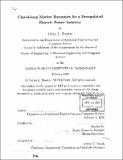Closed-loop market dynamics for a deregulated electric power industry
Author(s)
Skantze, Petter L., 1973-
DownloadFull printable version (3.839Mb)
Alternative title
Optimal allocation of control generation in a deregulated power market
Advisor
Marija Ilic.
Terms of use
Metadata
Show full item recordAbstract
The deregulation of the electric power industry in the United States has put pressure on system operators to maintain security and performance levels under increasingly uncertain market conditions. The debate over which market structure is best suited to facilitate provision of power on a competitive basis is still ongoing. In this thesis, a summary is provided first of the effects of deregulation in the U.K. and Scandinavian markets. Based on this summary, a new market structure for trading electrical power is proposed. The trading process is separated into three markets: the long-term, spot and controls markets, distinguished by time frames as well as their functionality. Extensive modeling of the technical behavior of the system as well as the economic decision process of industry participants is introduced. A simulation of the market, driven by stochastic disturbances, shows how entirely profit-based generators adapt themselves to optimize overall social welfare. The second contribution from this thesis is the development of a new concept for market-based frequency controls. By requiring information about load volatility to be included in bilateral contracts, system operators will be able to provide individualized incentives for generators and loads to reduce the overall need for system control. In addition, a modification to the existing criteria for frequency regulation is proposed. It is shown how by relying solely on system frequency as a control variable, an inter-area market for controls can be created. In addition to improving efficiency and taking advantage of inter-area price differentials, the new criterion also eliminates the need for real time coordination of generators participating in frequency control.
Description
Thesis (M.Eng.)--Massachusetts Institute of Technology, Dept. of Electrical Engineering and Computer Science, 1998. Includes bibliographical references (leaves 78-79).
Date issued
1998Department
Massachusetts Institute of Technology. Department of Electrical Engineering and Computer SciencePublisher
Massachusetts Institute of Technology
Keywords
Electrical Engineering and Computer Science